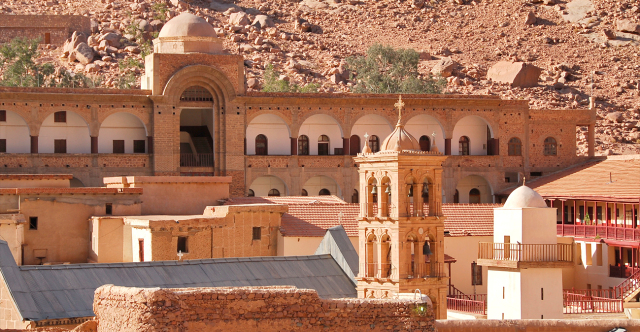Athens is now faced with Cairo invoking a court ruling that strips the Monastery of Saint Catherine of Sinai of its long-held property rights. In response, Athens will send a specialized team of experts tomorrow to discuss Cairo’s intentions and assert the need to honor a previous agreement aimed at an out-of-court resolution.
According to current plans, if necessary, Greek Foreign Minister Giorgos Gerapetritis will also travel to Cairo to negotiate at the highest political level, seeking to resolve any obstacles or establish a definitive understanding.
The third article of the prior settlement (source: Kathimerini) clearly acknowledged the Monastery’s ownership:
“The parties agree that, in accordance with the Monastery of Saint Catherine’s registration on the World Heritage List, the Monastery, its buildings, land, churches, and related structures referenced in the signed document by both parties, constitute property belonging to the Monastery, part of the Greek Orthodox faith.”
Athens asserts that this article must serve as the basis for any discussions and is open to considering proposals from Egypt, provided they do not compromise the Agreement’s core principles. In a communication with President El-Sisi, Prime Minister Kyriakos Mitsotakis stressed:
“…the preservation of the Greek Orthodox and pilgrimage nature of the Holy Monastery of Saint Catherine in Sinai is critically important.”
It is clear that Cairo has intentionally delayed signing the Agreement, now leveraging the court ruling (which has faced scrutiny regarding judicial independence in EU reports) to push for significant changes that would undermine the Monastery’s recognized ownership.
A statement from Egypt’s presidency after the call between Prime Minister Mitsotakis and President El-Sisi highlighted:
“…Egypt remains committed to maintaining the unique and sacred religious status of the Monastery of Saint Catherine, aligning this with the recent court ruling, which reaffirms the Monastery’s unique heritage and status.”
Egypt is attempting to detach the Monastery’s ownership from its religious significance, using the court ruling to backtrack from the Agreement.
Notably, the court’s decision allows monks to perform religious duties on the Monastery grounds but states that ownership lies with the Egyptian state, managed by the Antiquities Protection Authority.
This effectively reduces the Monastery’s small, aging monastic community of about twenty members—facing uncertain future prospects—to the status of “guests” in their own home after 1,500 years of continuous operation.
Athens is alarmed by the situation. While there is a desire to maintain the valuable Greek-Egyptian relationship, the lack of adherence to terms on such a sensitive issue is viewed as a concerning precedent.
Greece might apply pressure on Cairo by warning of potential adverse effects, not just on bilateral relations but also on Egypt’s broader connections with the EU, which it hopes to receive €25 billion in aid from over the coming years. Greece has spent the last 12 years persuading Europe to overlook Egypt’s human rights issues in favor of strengthening ties with the Sisi regime.
Additionally, given uncertainty about how a future Trump presidency might address relations with Egypt, any actions taken by the Orthodox community emphasizing Egypt’s stance on this historic Christian site may not be favorably received in Washington, where narratives of “civilization clashes” prevail.
Nonetheless, due to the complexities of the negotiations, some believe a compromise is necessary to accommodate Egyptian political concerns and reach a new agreement that aligns with the court ruling.
A source familiar with the discussions emphasizes the need for a “realistic” approach:
“It is vital to ensure respect for the Monastery’s historical religious spaces and the monks’ ability to fulfill their religious roles, irrespective of property issues.”
Cairo appears prepared to offer assurances regarding the maintenance of the Monastery’s religious character and to allow monks to perform their duties without interference. However, this may not suffice.
If monks lose access and rights to their buildings and properties within and outside the Monastery, they will lack the essential resources needed for its ongoing operation. Gradually, this could transform the institution into a mere tourist attraction.
This challenge now extends beyond the Monastery’s ownership—it is legally designated as Egyptian state property. This situation offers no security should a new Egyptian government opt to withdraw the current guarantees offered by President Sisi.
The path to establishing the Agreement has been challenging. Athens waited nearly eight months, sending repeated reminders to Cairo, before Egypt appointed a representative to engage in negotiations alongside the Greek delegation.
Eventually, Egypt named the Governor of South Sinai as its representative. After lengthy discussions, both parties reached a settlement acknowledging the Monastery’s full ownership rights. The atmosphere was positive, with even talks of a Memorandum of Understanding (MoU) to address long-term matters like residence permits and citizenship for the monks and newly appointed Archbishops.
The initial plan was to sign the Agreement ahead of President Sisi’s visit. However, as delays emerged, hopes shifted to finalizing it during the Athens-hosted Supreme Cooperation Council (SCC), only for Egypt to stall again.
At one point, the Egyptian Ambassador reached out to Archbishop Damianos to relay an objection from the Egyptian Ministry of Justice—a surprising and disappointing revelation, given that the agreement had previously undergone review by all relevant ministries.
The Greek and Monastery representatives repeatedly requested clarification on the desired changes from their Egyptian counterparts. However, no explanation was provided, suggesting that the delays were intentional, timed to align with the recent court ruling, which now invalidates the agreed settlement.
Ask me anything
Explore related questions

















